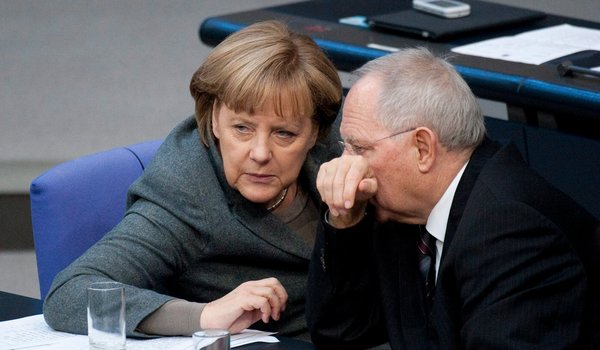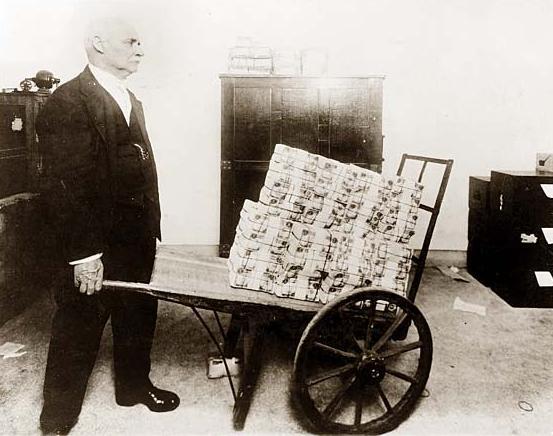Europe Headed For The Brink. . .
If you really think this won't hit us hard, here, may I refer you to the Weimar Republic and where that lead the world?
NYT:
Banks Build Contingency for Breakup of the Euro

Chancellor Angela Merkel of Germany and the nation's finance minister, Wolfgang Schäuble.
By LIZ ALDERMAN
Published: November 25, 2011
PARIS — For the growing chorus of observers who fear that a breakup of the euro zone might be at hand, Chancellor Angela Merkel of Germany has a pointed rebuke: It’s never going to happen.
But some banks are no longer so sure, especially as the sovereign debt crisis threatened to ensnare Germany itself this week, when investors began to question the nation’s stature as Europe’s main pillar of stability.
On Friday, Standard & Poor’s downgraded Belgium’s credit standing to AA from AA+, saying it might not be able to cut its towering debt load any time soon. Ratings agencies this week cautioned that France could lose its AAA rating if the crisis grew. On Thursday, agencies lowered the ratings of Portugal and Hungary to junk.
While European leaders still say there is no need to draw up a Plan B, some of the world’s biggest banks, and their supervisors, are doing just that.
“We cannot be, and are not, complacent on this front,” Andrew Bailey, a regulator at Britain’s Financial Services Authority, said this week. “We must not ignore the prospect of a disorderly departure of some countries from the euro zone,” he said.
Banks including Merrill Lynch, Barclays Capital and Nomura issued a cascade of reports this week examining the likelihood of a breakup of the euro zone. “The euro zone financial crisis has entered a far more dangerous phase,” analysts at Nomura wrote on Friday. Unless the European Central Bank steps in to help where politicians have failed, “a euro breakup now appears probable rather than possible,” the bank said.
Major British financial institutions, like the Royal Bank of Scotland, are drawing up contingency plans in case the unthinkable veers toward reality, bank supervisors said Thursday. United States regulators have been pushing American banks like Citigroup and others to reduce their exposure to the euro zone. In Asia, authorities in Hong Kong have stepped up their monitoring of the international exposure of foreign and local banks in light of the European crisis.
But banks in big euro zone countries that have only recently been infected by the crisis do not seem to be nearly as flustered.
Banks in France and Italy in particular are not creating backup plans, bankers say, for the simple reason that they have concluded it is impossible for the euro to break up. Although banks like BNP Paribas, Société Générale, UniCredit and others recently dumped tens of billions of euros worth of European sovereign debt, the thinking is that there is little reason to do more.
“While in the United States there is clearly a view that Europe can break up, here, we believe Europe must remain as it is,” said one French banker, summing up the thinking at French banks. “So no one is saying, ‘We need a fallback,’ ” said the banker, who was not authorized to speak publicly.
When Intesa Sanpaolo, Italy’s second-largest bank, evaluated different situations in preparation for its 2011-13 strategic plan last March, none were based on the possible breakup of the euro, and “even though the situation has evolved, we haven’t revised our scenario to take that into consideration,” said Andrea Beltratti, chairman of the bank’s management board.
Mr. Beltratti said that banks would be the first bellwether of trouble in the case of growing jitters about the euro, and that Intesa Sanpaolo had been “very careful” from the point of view of liquidity and capital. In late spring, the bank raised its capital by five billion euros, one of the largest increases in Europe.
Mr. Beltratti said that Italy, like the European Union, could adopt a series of policy measures that could keep the breakup of the euro at bay. “I certainly felt more confident a few months ago, but still feel optimistic,” he said.
European leaders this week said they were more determined than ever to keep the single currency alive — especially with major elections looming in France next year and in Germany in 2013. If anything, Mrs. Merkel said she would redouble her efforts to push the union toward greater fiscal and political unity.
That task is seen as slightly easier now that the crisis has evicted weak leaders from troubled euro zone countries like Italy and Spain. But it remained an uphill battle as Mrs. Merkel continued this week to oppose the creation of bonds that would be backed by the euro zone.Politically, even the idea of a breakaway Greece is increasingly considered anathema. Despite expectations that Greece — and the banks that lent to it — may receive European taxpayer bailouts for up to nine years, officials fear its exit could open a Pandora’s box of horrors, such as a second Lehman-like event, or even the exit of other countries from the euro union.
Europe’s common currency union was formed more than a decade ago and now includes 17 European Union members, creating a powerful economic bloc aimed at cementing stability on the Continent. It ushered in years of prosperity for its members, especially Germany, as interest rates declined and money flooded into the union — until the Lehman Brothers bankruptcy sent global credit markets into chaos three years ago and the financial crisis took on new life with the near-default of Greece last year. The creation of the euro zone meant countless interlocking contracts and assets among the countries, but no mechanism for a country to leave the union.
But as the crisis leaps to Europe’s wealthier north, banks have been increasing their preparedness for any outcome. For instance, while it would certainly be legally, financially and politically complicated for Greece to quit the euro zone, some banks are nonetheless tallying how euros would be converted to drachmas, how contracts would be executed and whether the event would cause credit markets to seize up worldwide.
The Royal Bank of Scotland is one of many banks testing its capacity to deal with a euro breakup. “We do lots of stress-test analyses of what happens if the euro breaks apart or if certain things happen, countries expelled from the euro,” said Bruce van Saun, RBS’s group finance director. But, he added: “I don’t want to make it more dramatic than it is.”
Certain businesses are taking similar precautions. The giant German tourism operator TUI recently caused a stir in Greece when it sent letters to Greek hoteliers demanding that contracts be renegotiated in drachmas to protect against losses if Greece were to exit the euro.
TUI took the action just days after Mrs. Merkel and President Nicolas Sarkozy of France acknowledged at a meeting earlier this month of G-20 leaders in Cannes, France, that Greece could well leave the monetary union. On Thursday, Greece’s central bank warned that if the country failed to improve its finances quickly, the question would become “whether the country is to remain within the euro area.”
In a survey published Wednesday of nearly 1,000 of its clients, Barclays Capital said nearly half expected at least one country to leave the euro zone; 35 percent expect the breakup to be limited to Greece, and one in 20 expect all countries on Europe’s periphery to exit next year.
Some banks are now looking well beyond just one country. On Friday, Merrill Lynch became the latest to issue a report exploring what would happen if countries were to exit the euro and revert to their old currencies. If Spain, Italy, Portugal and France were to start printing their old money again today, their currencies would most likely weaken against the dollar, reflecting the relative weakness of their economies, Merrill Lynch calculated.
Currencies in the stronger economies of Germany, the Netherlands and Ireland would probably rise against the dollar, according to the analysis.
In Asia, banks and regulators view the situation with growing alarm. Norman Chan, the chief executive of the Hong Kong Monetary Authority, said on Wednesday that regulators had stepped up their surveillance of banks’ exposure to Europe.
Regulators have been working with bank managers on stress tests to determine how the banks’ financial stability might be affected by an increasingly severe financial dislocation in Europe, said a Hong Kong banker who insisted on anonymity.
The main danger of a euro breakup, said Stephen Jen, managing partner at SLJ Macro Partners in London, is “redenomination risk,” the unpredictable effect that a euro breakup would have on financial assets as newly created currencies sought their own levels in the market and the value of contracts drawn up in euros came into question.
Most people hope that will not happen. “Remember when Lehman went bankrupt — nobody could anticipate what happened next,” said the French banker who was not authorized to speak publicly. “That was a company, not a country. If a country leaves the euro — multiply the Lehman effect by 10,” he said.
Telegraph:
Prepare for riots in euro collapse, Foreign Office warnsBritish embassies in the eurozone have been told to draw up plans to help British expats through the collapse of the single currency, amid new fears for Italy and Spain.
As the Italian government struggled to borrow and Spain considered seeking an international bail-out, British ministers privately warned that the break-up of the euro, once almost unthinkable, is now increasingly plausible.
Diplomats are preparing to help Britons abroad through a banking collapse and even riots arising from the debt crisis.
The Treasury confirmed earlier this month that contingency planning for a collapse is now under way.
A senior minister has now revealed the extent of the Government’s concern, saying that Britain is now planning on the basis that a euro collapse is now just a matter of time.
“It’s in our interests that they keep playing for time because that gives us more time to prepare,” the minister told the Daily Telegraph.
Recent Foreign and Commonwealth Office instructions to embassies and consulates request contingency planning for extreme scenarios including rioting and social unrest.
Greece has seen several outbreaks of civil disorder as its government struggles with its huge debts. British officials think similar scenes cannot be ruled out in other nations if the euro collapses.
Diplomats have also been told to prepare to help tens of thousands of British citizens in eurozone countries with the consequences of a financial collapse that would leave them unable to access bank accounts or even withdraw cash.
Fuelling the fears of financial markets for the euro, reports in Madrid yesterday suggested that the new Popular Party government could seek a bail-out from either the European Union rescue fund or the International Monetary Fund.
There are also growing fears for Italy, whose new government was forced to pay record interest rates on new bonds issued yesterday.
The yield on new six-month loans was 6.5 per cent, nearly double last month’s rate. And the yield on outstanding two-year loans was 7.8 per cent, well above the level considered unsustainable.
Italy’s new government will have to sell more than EURO 30 billion of new bonds by the end of January to refinance its debts. Analysts say there is no guarantee that investors will buy all of those bonds, which could force Italy to default.
The Italian government yesterday said that in talks with German Chancellor Angela Merkel and French President Nicolas Sarkozy, Prime Minister Mario Monti had agreed that an Italian collapse “would inevitably be the end of the euro.”
The EU treaties that created the euro and set its membership rules contain no provision for members to leave, meaning any break-up would be disorderly and potentially chaotic.
If eurozone governments defaulted on their debts, the European banks that hold many of their bonds would risk collapse.
Some analysts say the shock waves of such an event would risk the collapse of the entire financial system, leaving banks unable to return money to retail depositors and destroying companies dependent on bank credit.
The Financial Services Authority this week issued a public warning to British banks to bolster their contingency plans for the break-up of the single currency.
Some economists believe that at worst, the outright collapse of the euro could reduce GDP in its member-states by up to half and trigger mass unemployment.
Analysts at UBS, an investment bank earlier this year warned that the most extreme consequences of a break-up include risks to basic property rights and the threat of civil disorder.
“When the unemployment consequences are factored in, it is virtually impossible to consider a break-up scenario without some serious social consequences,” UBS said.




- On Preparing For War Against The Government When The Government Is Preparing For War Against You
Your Money Is Their Money: EU Taxes Bank Deposits IT'S FOR THE COMMON GOOD: LONDON (Reuters) - The surprise decision by euro zone leaders to part-fund a bailout of Cyprus by taxing bank deposits sent shockwaves through financial markets on Monday,...
- Epaminondas To Fed: At Least Take Me Out To Dinner First
Fed may give loans to IMF to help euro zone: paperThe Federal Reserve, along with the 17euro zone national central banks, may help provide the International Monetary Fund with funds that could be used to aid debt-ridden states, a German newspaper said.Die...
-
Are you ready to get paid in Euros? Yen? British pounds? How about a whole new world currency? Businessweek: Central Banks Prepare to Distribute Foreign Currency at Home By Craig Torres Nov. 30 (Bloomberg) -- The Federal Reserve and five other central...
-
Newsmax: Dark Times For the Eurozone Hang on to your wallet. by John Hayward Things are looking pretty bad over in the Eurozone, with CNBC’s Jim Cramer calling the situation “DEFCON 3, two stages from a financial collapse so huge it’s hard to get...
-
IMF = American Taxpayers The Telegraph: IMF drawing up £517bn package to save Italy, Spain and the euro The International Monetary Fund is being lined up potentially to help Italy and Spain amid growing fears that a European rescue scheme will not be...
